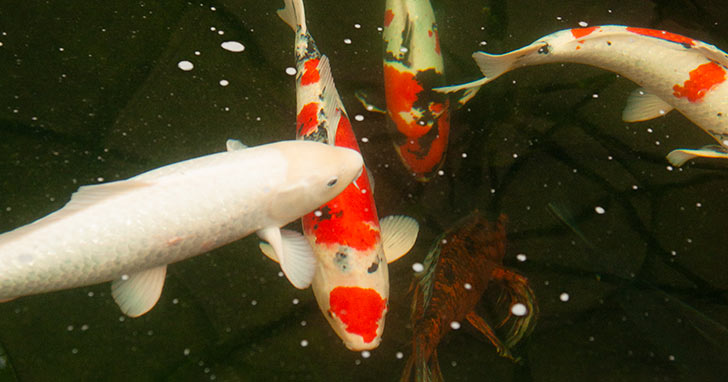Everyone who loses valuable fish comes to the same conclusion: it pays to devote time and effort to predator control. Here are some suggestions to help keep the aquatic life in your pond safe.
What pond predators are in my area?
Wherever you live, there are probably more pond predators about than you may think. If you live in a suburban neighborhood, you might be surprised to discover that your storm drain system may be a superhighway for woodland wildlife like foxes and raccoons. And due to changes in climate and the availability of habitat, more animals are showing up in backyards more often than before. The range of coyotes, bobcats, and other large wild cats is increasing, with many being sighted even in urban areas.
You can learn a great deal about local predators by contacting your municipal animal control, or your county or state fish and game departments. If you are lucky to have a pond association in your area, members can be a valuable resource. All can advise you on the types of wildlife to watch for and recommend safe techniques for protecting you and your property.
What is the first step to keep my pond safe from predators?
Small ponds with shallow areas make fish easy prey. On the other hand, most predators will not venture into ponds where fish have room to escape or hide (making their hunt difficult), or from which their own exit may be awkward.
If you are about to expand your pond or build an additional one, we recommend that you build it as large and deep as possible, and with steep sides. If you plan to have Koi, a depth of three to four feet is recommended. Also, because you can always elevate your pond plants with rocks, make plant shelves 12" to 16" deep so they won't be used as access points by predators.
Always locate your pond where you can observe it from a window and have a light ready to illuminate it at the flip of a switch.
What tools can I use to keep my pond stock safe from predators?
We hope you will agree that control of predators is preferable to their eradication. Fortunately, you have many effective options:
- Netting - Covering your pond with netting, particularly at night when predators are most active, is an excellent way to control most predators. Netting can also be used seasonally, for example, during spring and fall when animals are most active.
- Decoys - Some predators like herons are territorial and will not intrude on an area they perceive as already dominated by one of their kind. Others simply won't risk attack from a natural rival like a snake or owl. These are all available as decoys and work very well. For optimum effect, they need to be moved about frequently so that predators don't catch on.
- Alternative food and water - Remote placement of bird feeders and waterers on the opposite side of your property can draw predators away from your pond.
- Repellents - Repellents use smell and taste to ward off predators like deer, squirrels, and raccoons. They are very versatile because they can be applied wherever you desire. For best results, they should be renewed at intervals or after rain.
- Hiding places - Predators cannot eat your fish if they cannot catch them. Make sure your pond provides plenty of floating vegetation for your fish to hide under, and structure to dive below. Sections of wide diameter black PVC tubing can be placed inconspicuously on the bottom of your pond. These have the added advantage of providing good habitat for your fish. If you encounter an agile predator like an otter, consider a fish refuge, which is a hard mesh cage that allows fish in but keeps predators out.
Don't wait to experience a loss. Take steps to protect your pond from predators today
Predators arrive at your pond by many routes:
- On the land: Raccoons, opossums, muskrats, beavers, otters, foxes, or even bears may eat your fish. Though deer will not eat your fish, they might take a break from your garden to graze on your pond plants.
- Through the air: Most wild birds will leave your fish alone, but there are two species that must be dealt with if they are common in your area: Herons and Kingfishers. Herons are aggressive fishing machines. Unchecked, they can wipe out a pond of Koi in a couple of hours. The much smaller, but well-named Kingfisher will swoop in from a nearby tree or perch and spear your fish with its long sharp beak.
- In the water: If you have a creek or natural body of water nearby, amphibians can find their way into your pond. They commonly migrate through wet grass or standing water during heavy spring rains. Large bullfrogs, for example, will eat small fish. Snapping turtles will eat anything (and even snap at your finger), if you fail to take care.
Related Articles



